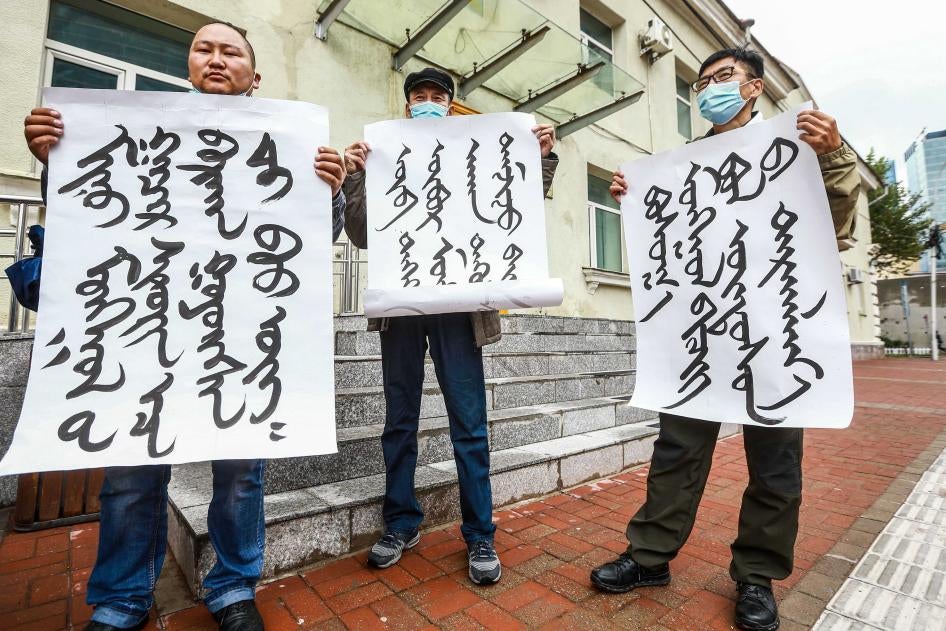(New York) – The Chinese government should reverse its new policy of increasingly replacing Mongolian with Mandarin Chinese as the language of instruction in Inner Mongolia schools, Human Rights Watch said today. Chinese authorities should also stop harassing those who have peacefully protested in support of Mongolian language education.
The US-based Southern Mongolian Human Rights Information Center reported on August 20, 2020, that education authorities had informed teachers that all elementary and middle schools in Inner Mongolia had to use Mandarin Chinese as the language of instruction for three subjects starting this new school year. Inner Mongolia is a region in northern China with 17 percent ethnic minority Mongols, who speak Mongolian as their mother tongue.
“As in Xinjiang and Tibet, the Chinese authorities appear to be putting political imperatives ahead of educational ones,” said Sophie Richardson, China director. “While Mongolian students are being told they’ll still have some classes in Mongolian, their concerns about it being phased out are entirely warranted.”
Students in Mongolian-medium schools had previously been taught in their mother tongue, alongside a daily hour of Chinese language instruction starting from the third grade. Starting this September, the education authorities will expect schools to teach three subjects in Mandarin Chinese: language and literature, “morality and law (politics),” and history. Authorities may be giving priority to these three subjects because they reflect the government’s emphasis on political and ideological education. Other classes, namely mathematics, sciences, art, music, and physical education, as well as Mongolian language, will still be taught in Mongolian.
In an August 31 statement, authorities in Mongolia said that the changes, following similar steps in Xinjiang in 2017 and Tibet 2018, also apply to ethnic minority schools in Gansu, Sichuan, and six other provinces and regions. The statement said that “Textbooks reflect the will of the [Chinese Communist] Party and the state … [and] directly concern the implementation of the Party’s educational guiding principle and the realization of educational goals.”
Authorities did not initially communicate the changes publicly – perhaps anticipating objections. During closed-door meetings, officials only showed teachers the headings of the central government policy, and required teachers to sign documents promising not to discuss the order.
After the policy was leaked, international media reported widespread school boycotts and various protests breaking out throughout Inner Mongolia. Videos show students shouting slogans and walking out of schools. Authorities swiftly responded with a crackdown, detaining Mongolian activists and beating protesters.
On August 23, authorities shut down Bainu, the only Mongolian-language social media site in China. Many Mongolian speakers earlier had posted complaints on Bainu about the policy change. Many posts on popular Chinese social media platforms such as Weibo and WeChat about “bilingual education” were censored. Authorities also allegedly harassed and detained some Mongolians who voiced their displeasure on these platforms.
China’s constitution guarantees minority language rights, and minority-medium education began to be introduced in schools in the relatively liberal 1980s. But in recent years, the Chinese government has rolled back minority language education rights across the country, particularly in Xinjiang and Tibet. The Chinese government calls these new efforts – in a confusing euphemism – “bilingual education.”
While many Tibetan parents support the idea of children learning in both languages, some are distressed at the near-total removal of Tibetan-language medium education, replacing it with classes conducted in Chinese. The developments reflect an assimilationist, Han-centric chauvinism that has gained momentum under President Xi Jinping’s leadership. The authorities now consider even local initiatives for the promotion of minority language activities in Tibet as “separatist,” punishable under the criminal code.
Authorities in the past have harassed and arbitrarily detained activists who criticized ethnic minority language policies and campaigned for mother-tongue education. In 2018, Tibetan language rights activist Tashi Wangchuk was sentenced to five years in prison for “inciting separatism.”
China’s assimilationist education policy contravenes international human rights law, particularly the United Nations Convention on the Rights of the Child, which China ratified in 1992, and the International Covenant on Civil and Political Rights (ICCPR), which China has signed but not ratified. Both treaties guarantee that children have the right to education in their own language and culture. China has also supported the UN Declaration on the Rights of Indigenous Peoples, which both endorses rights to Indigenous language education and the right of Indigenous people to control their educational systems and institutions.
“Chinese authorities should be focused on providing genuine bilingual education, not undermining it and persecuting its proponents,” Richardson said. “Reducing mother tongue education flies in the face of China’s constitution, international standards, and expert consensus, and erodes Mongolians’ distinct identity.”
|
News Release
China: Mongolian Mother-Tongue Classes Curtailed
New ‘Bilingual’ Policy Threatens Children’s Education
Your tax deductible gift can help stop human rights violations and save lives around the world.
Region / Country
Topic
Most Viewed
-
February 25, 2026
Jailed Critic in Rwanda Faces 30-Year Sentence

-
February 20, 2026
Abuses in Cameroon After US Deports Third-Country Nationals

-
November 25, 2019
A Dirty Investment

-
June 3, 2025
“They’re Ruining People’s Lives”

-
October 5, 2017
“They Said We Are Their Slaves”





